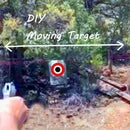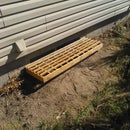Introduction: What to Do With a Felled Tree
If you have ever cut down a tree in pieces, you'll be left with a lot of debris.
Here are a few ideas for the left-overs.
Step 1: Materials
All of the project examples were built using these simple tools and materials:
TOOLS
1) (Optional) Saws-All aka reciprocating saw with branch cutting blade (to cut down branches into rough lengths -- see photo)
2) Table saw (to rip [i.e. cut length-wise] branches)
3) Chisels (Note when you go to buy these, make sure that they are pre-sharpened; some are not)
4) Dremel (for scroll work, sanding, tweaking)
5) (Optional) Electric sander
6) (Optional) Router (to carve indentations as needed)
7) Drill
7a) 1/8 inch drill bit
7b) 1 inch drill bit (or larger)
8) (Optional but a good excuse to get one) Nail gun
9) (Optional) Electric planer (to smooth down trunk slices)
10) (Optional) Jig saw
MATERIALS
1) Tree and branches
2) Denatured alcohol (to remove sandpaper dust)
3) Dust mask
4) Sugru (for various hold-downs)
5) Wood glue
6) Drywall screws
7) LOTS of sandpaper, 150-220 grit. No matter how much you buy, you'll never buy enough. I recommend the red Diablo brand; expensive but worth it
8) (Optional) Stain
9) (Optional) Polyurethane
Step 2: Dictionary O' Terms
I use quite a few professional woodworker terms here, so let me explain them briefly:
Banana cut or slice: A round slice taken out of a branch, much like the way you slice a banana for a peanut butter sandwich.
Banana split: A length wise split down a branch, much like the way you cut a banana length-wise for a banana split. Some people also refer to these as rip cuts.
Thingy or thingie: An object of some sort that you are supposed to understand.
Butt table slice: Same as a banana cut , but taken out of a trunk rather than just a branch.
Crotch: A limb containing a branch that shoots out at a good angle for making a hook. Warning: a crotch stick can be rather itchy, though. (thanks to spanner1969 and annabelle's mom)
Miter: A cut that miter-might-not be exactly 45 degrees.
Step 3: A "Butt" Table for the Office
The term "butt" table is in reference to the slab used for the table top: when viewed straight on it resembles. . . well you know.
To keep the crack from spreading, I put the slab in a garbage bag, added 4 cans of denatured alcohol, and let it sit and soak in a plastic bin for several days before staining, etc.
The stand was just a left over piece of an old table.
Here's the 'able for creating a butt table:
https://www.instructables.com/id/Butt-Table/
Step 4: Corner Table
This is a small corner table for the office built using three main branches and a few supporting branches for stability.
The top of the table was made using smaller branches that were ripped in half, exposing the interesting internal rings and veins, and then pieced together side-by-side.
This table's main branch also had a secondary branch that could be used for a coat hook. Finally, a lamp was added and the wires hidden in the back, secured to the branch with Sugru.
Step 5: Address Totem Pole
Made from one of the larger branches.
Step 6: Sign (Sigh)
This was made from a piece of bark, not a branch. The inside of the bark was used for the lettering which was created using a Dremel tool.
Alas, the sign does not work. Still keep getting roofers and people selling magazines.
Step 7: Shelf
This is one of the easier projects and most bang-for-the-buck.
First get a good sized branch and split it in two (that is where a table saw comes in handy). Use one of the halves for the shelf.
Then find two quarter-sized diameter branches that have a "crotch". Cut them to size and they are used as the supports for the shelf.
To hold the supports to the wall, I drilled lil' tiny holes in the top and bottom and secured them using hat pins to the wall.
Step 8: Push Stick
This isn't that great of a utility but does show how splitting a branch down the center can reveal interesting patterns.
Step 9: Pencil Holder
This was created from a thicker branch and cut using a table saw on an angle to show off the internal ring patterns. A 1 inch hole was drilled as the container. Note that the stain job is pretty crummy; I should have used a wood conditioner first so that the stain would settle in more evenly.
Step 10: Locket
This is a slice taken out of a branch (like a banana slice) and a hole drilled through it. A picture was then glued on the back.
Step 11: Jewelry Tree
This is a branch with multiple sub-branches trimmed down and inserted into a larger branch slice that acts as the support.
Step 12: Hooks
These arr the easiest and most fun things to make. Split a branch that has an offshoot branchette down the center. Trim down the branchette to act as a hook. These are pretty much the same architecture as the shelf supports but the branchettes are shorter to accommodate a cap, jacket, keys, leash, or something smaller.
These were also embellished with some scroll writing on the top of the hooks for added decoration.
Detailed Instructable for hooks is at:
https://www.instructables.com/id/Dog-Leash-Hook-from-Tree-Branches/
Step 13: Hook (close Up)
Here's how one of the hooks looks when applied to the wall. Again, two lil' tiny holes were drilled; one on the top and one on the bottom and hat pins were used to secure the hook to the wall.
Other photo shows close-up of another batch o' hooks.
Step 14: Hook, Variation 2
Here's a hook made into a refrigerator magnet.
Step 15: Mirror or Picture Frame
This frame was made by slicing (or routing) or cutting out a length-wise slice out of four similarly-sized branches, about 2.5 inches around. The mirror was then slid into each of the cut-out troughs.
Step 16: Frame, Variation 2
This is a picture-sized frame, again the same principle as the mirror frame, only smaller. I cheated in this photo since the frame wasn't complete yet, but you can get the picture (ha).
Step 17: Foot Rest
This is a smaller variation of a table, just four primary, similarly sized branches with a few supporting branches. The cushion was an old 80's style plaid job that was re-upholstered with some western-looking fabric found at a garbage sale.
Step 18: Corner Table, Variation 2
This is another corner shelf. You can see how the shelves were filled in using split branches, i.e. branches split down the middle. Again, a table saw was handy for this.
A lil' tiny aspen leaf was also decoupaged on the front for added flair.
(There is also a lil' tiny speck of blood that is not visible in this shot.)
Step 19: Coat Rack
This is from a larger branch that had a number of smaller off-shoots. The base is from an old bird feeder and filled with cement to make it steady. But man, is it heavy.
Step 20: Shoe Rack
Here's a rack to place at the front of your house or cubicle for guests to place their shoes. A couple of crotch branches at the bottom were used to hold up the rack.
Step 21: Hat Rack #3
Here's another hat rack, the bottom is a set of banana-split feet with a hole between them.
Note I just poly'ed this one-- didn't bother with the stain since the cottonwood looked pretty cool just naked.
Step 22: Coasters
I don't use coasters so I didn't experiment too much with this project. These are simply slices (like banana slices) taken from a good
sized branch, using a table saw. These could be stained and back-glued with felt for someone who does use coasters.
Step 23: Hook, Variation 3
Here the hook is used to hold up a calendar. To the right is a hook without the hook, or a ook, I guess. Just a decoration piece.
Step 24: Moon
This is a large banana slice (actually a butt slice) taken from the trunk and a hole was cut using a jig saw. It's about 16 inches high.
Step 25: Bird Feeder
One of the things you can do with the left-over stump is add bird feeders as in this shot . . .
Step 26: Corner Table, Variation 3
Here is another variation on the corner table, this one also has a built-in lamp. Use a long drill bit (about 5/8 inch) to get a hole (about 12 inches deep) into the branch to run the cable which then can come out the back.
Step 27: Butt Table, Variation 2
This butt table uses a large branch (about 5-6 inches diameter) as the stand. To keep the stand from tipping over, there are two banana-split branch halves attached as "feet" at the bottom of the stand. Hard to see from the photo, but they run perpendicular to the camera shot (i.e. forward and back).
Instructable for this table is at:
https://www.instructables.com/id/Butt-Table/
Step 28: Corner Table, Variation 4
As you can tell, corner tables are fairly easy to build and are nice because they can be placed in a corner and not take up too much room. And you can put stuff on them, so they are useful.
In this table, which is not yet complete, I plan to put 120-volt powered LED's at the very tips of the branches that swoop over the table.
Step 29: Water Fountain or Plant Stand
The left-over tree stump was used as a stand for a water fountain feature.
Warnings about this project:
1) It is hard to find a solar powered water pump (reasonably priced)
2) It is hard to find an electric switch that turns automatically ON during the day but OFF at night
3) It is hard to dig up a trench for electrical cable
4) Water pumps do not come with their own screen/filter
5) Water evaporates fast in the summer
6) Pumps burn out when there is no water for them to pump
Step 30: Chair
The chair is similar to the foot stool; just substitute longer branches for the back rest. I used supporting branches cut at roughly 45 degree angles to support the back rest and the seat. Banana split branches, lined up, made up the seat pan. Note here that the bark was left on just as a variation.
Step 31: Hook, Variation 4
This hook is used for a dog leash.
Step 32: Hook, Variation 5
This is actually a double hook.
It was made out of a branch that I picked up near the Maginot Line in France.
Step 33: Help-I've-Fallen-and-Can't-Get-Off-My-Butt Table
This is a lil' tiny butt table built to hold the LifeLine (of the "Help, I've fallen and I can't get up" fame). Here a left over trunk is used as a base.
Step 34: Guitar Stand
Couple of crotch branches, held in place by a trunkette
Step 35: Yoga Mat Stand
Smaller version of a guitar stand, useful for holding yoga mat. Or toilet plunger maybe.
Step 36: Lamp
{"context":{"location":{"href":"https://www.instructables.com/editInstructable/publish/EWGO8J6HJ5ZQVG1","origin":"https://www.instructables.com","protocol":"http:","host":"www.instructables.com","hostname":"www.instructables.com","port":"","pathname":"/editInstructable/publish/EWGO8J6HJ5ZQVG1","search":"","hash":""},"jQuery11020763959253825865":1,"b":{"sizzle-1477403667850":{"parentNode":["4012 22",81]}},"h":{},"gtmHasClickListenerTag":true,"gtmHasLinkClickListenerTag":true,"gtmLinkClickListener":true},"selector":"#editor-Object-165"}

Runner Up in the
Weekend Projects Contest













